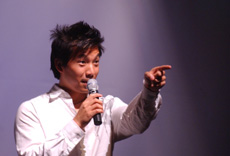Actor encourages students to find their voice

Online Poster
October 11, 2004
Lincoln Hall pulsated with the powerful vocals and dynamic insights of Welly Yang, a Taiwanese-American Broadway star and television actor, Saturday evening as part of the Taiwanese American Students Club (TASC) speaker series.
Throughout his talk, Yang mixed his experiences as an Asian-American performer with emotional song renditions that articulated the passion behind his words. He said he has been able to combine his love for the performing arts with a desire to cause positive social change, especially in terms of Asian-American representation in American culture.
About 50 audience members listened as Yang encouraged them to find their own metaphorical song to sing and stage to sing on, no matter what their ethnicity or passion may be.
“Through finding our passion, we are able to give this world our greatest contribution,” he said.
Among his long list of accomplishments, Yang has played roles on Broadway’s Miss Saigon and Falsettoland and also on television’s Law and Order: Special Victims Unit. He founded a theater company for Asian Americans called Second Generation in 1997.
Get The Daily Illini in your inbox!
“To many people in this country still, the Asian face is somehow foreign, the Asian face doesn’t belong,” he said. “As an actor, it became really clear to me that the roles that were available to me as a performer would be a reflection of how Americans saw Asians.”
He said the goal of Second Generation is to create a vehicle of musical theater that tells Asian-American stories in a new and exciting way and speaks to larger audiences through popular artistic forms. Yang said he found himself wanting to express his own humanity and the humanity of Asian Americans through his love of the performing arts.
“I believe that arts do have an important place in society,” he said. “When people look back to who we are 500 years from now, they’ll always look back to our culture. The culture – the stories we tell – are really the mirrors of who we are, and when Asian Americans are left absent from that, I think our country … is less complete.”
Yang believes every artist has his or her own experiences and stories to share. The more artists seek to tell their story, the more complete the cultural face will become in America, he said.
One of Yang’s personal heroes is the character of Don Quixote from the musical Man of La Mancha who changes the world through his different perception, he said. The possibility of changing society through one’s worldview is what motivates him everyday, Yang said.
Yang closed his talk with a song from Man of La Mancha and told the audience, “It is only our own psyche that limits our possibilities.”
Rubie Ruivivar, sophomore in LAS, said she was impressed by how Yang tied his words together with song.
“He could say that he was passionate about performing, but it was another to actually hear and see it,” she said.
Freshman in LAS Julianne Chiu said she was interested in seeing Yang because she wanted to hear about his first-hand experience as an actor in Miss Saigon, a show that is controversial in its portrayal of Asian Americans. She said she was glad he addressed such issues.
Calvin Chen, external vice president of TASC and coordinator for the event, said he had met Yang at a Taiwanese-American conference and spoke with him about coming to the University.
“I thought he had a very interesting story, especially as an Asian American on Broadway, which is rare,” he said. “I hoped people could hear the Taiwanese-American story.”
While most TASC events have mostly Asian audiences, Chen said 20 percent of the people who attended Saturday’s event were not Asian. He said he had hoped the event would bridge cultures and bring students together.
Aileen Connolly, junior in communications, said as a non-Asian American, the event was a good eye-opener. She agreed that people often forget about considering the representation of Asian Americans.
“I think it would have been better if more non-Asian Americans could have been here,” she said.






